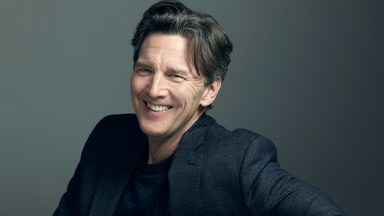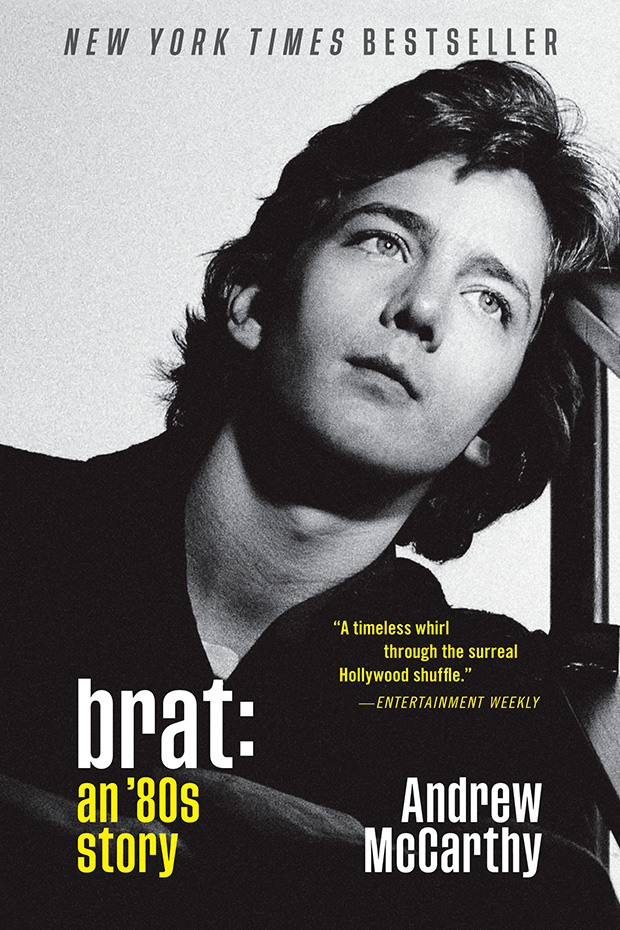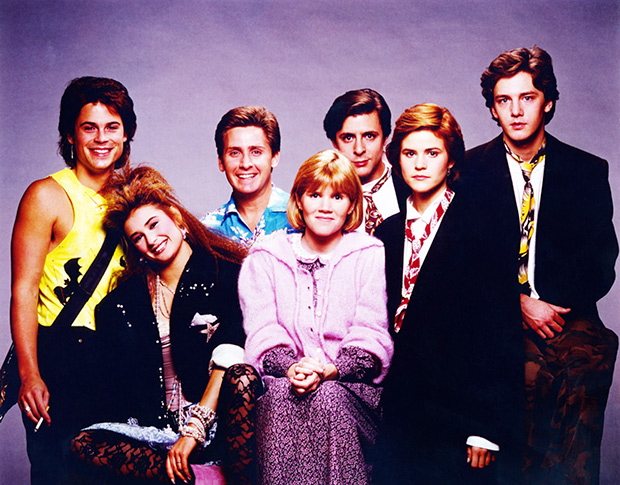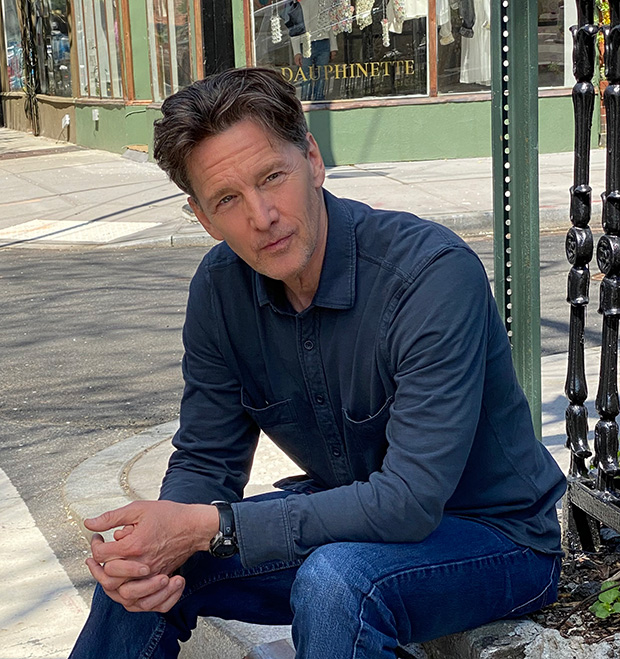
Andrew McCarthy takes a trip down memory lane and explores his meteoric rise to fame in Brat: An ’80s Story, available via paperback on May 10. Since 1985, Andrew and so many of the biggest young stars of that whiplash-inducing era — including Demi Moore, Rob Lowe, etc. — became “indelibly linked” as the Brat Pack after a New York Magazine feature went “viral.” For so long, the Pretty In Pink and St. Elmo’s Fire star steered clear of appreciating the Brat Pack — until now.
HollywoodLife spoke EXCLUSIVELY with the actor, writer, and director about the road to Brat: An ’80s Story. He reveals how writing his memoir allowed him to eventually recognize how his career, his alcoholism, and his relationship with his father were all “interwoven” together. Andrew also gives an update about a possible Brat documentary, talks about his son becoming an actor, and his latest role on The Resident.

I first read Brat last year when it came out and just absolutely loved it. You dive into so much of your family, your rise to fame, all of it. What part of Brat was the most cathartic for you?
Andrew McCarthy: I don’t know if cathartic is the word, but when I first wrote the first draft it was just largely movies and professional stuff. And then I realized there were things that were happening to me in the ’80s. One was being in the movies, the second was the drinking, and the third was my relationship with my father. I realized sort of way after I went through the first sort of pass and wrote about the movies that there are huge pieces of the puzzle that explain certain actions that were missing. So then I added it in about the drinking, and then I did another pass. And I go, “Well, I need to talk about my dad here because that’s what was going on and also influencing things.” So I suppose I came to those two things after the professional part, but they explained certainly so much of my response to the professional aspects of it. It was like a three-legged stool. Without any one of those aspects, one of those legs, it would just sort of fall down. The drinking had been, by that point, decades in the past, and yet it was still kind of interesting to see how much it influenced my career and then my reaction to my father. I didn’t drink because I was in the movies or stressed from the movies or any of that nonsense. It was just I drank because I had a propensity toward alcohol. But to see how it intertwined with the movies, and then reaction to my father, and my father’s reaction, all that stuff was interesting to finally piece together like three strands of a braid of hair. They’re all interwoven. That was interesting to really put together in a way that I hadn’t put together so much before.
When it comes to the Brat Pack, have you ever thought about how social media would have impacted all of you at that time in your lives? So much of fame today is determined by how much influence you have on social media. Everything gets even more amplified these days.
Andrew McCarthy: The other day, my 8-year-old son and I were listening to the radio in the car, and an Elvis Presley song came on and I start singing along. My son goes, “Who is that?” I said, “It’s Elvis Presley.” He, of course, had no idea who Elvis Presley was. And I said, “He was the most famous person in the world. Even before I was born, he was the most famous person in the world. Everyone knew who Elvis Presley was.” And there were three TV channels back then and that was how people got all their information and the whole world. I’m not entirely convinced that just Twitter and Instagram are what make everyone famous. With the Brat Pack, there was no social media. Yet one magazine article within days made that term indelible for the rest of life. I’m not sure that we need social media to make everything so almighty famous. I think it churns through things certainly very quickly, and certainly, in the ‘80s we thought we were all very cutting edge with information overload. We always feel that way. I think we’re always feeling like we have more information than we did, and now we really do. We always have felt that way. Maybe it would have burned through in two days and gone to the next news cycle, and then some other catchy phrase appeared. It would have just disappeared quickly, you know what I mean? Whereas at that moment, for whatever reason, it hung on and there was no letting go.
You write toward the end that, to you, the Brat Pack never really existed at all in a physical sense. How do you feel now, especially after writing this book, that the moniker doesn’t really have any negative connotation to it anymore? There’s a sort of timeless, nostalgic element to it.
Andrew McCarthy: It totally has become warm and fuzzy. It’s interesting because when it first came out it was very scathing. The article was very scathing, and in the media and film industry, it was a very negative, pejorative term. But I think the public always sort of accepted it, which I didn’t realize at the time. The public always sort of accepted us as the ultimate insider, hip kids, and wanted to be part of that and viewed with affection. I resisted it for decades. I didn’t like it. I just felt that it was a pejorative, negative term and cast us in a negative way. I always said Rob Lowe handled it much better. He just knew at the beginning — they love it. But that’s Rob, and it was great the way he did it. For a generation of people and a certain demographic, it has become emblematic of their youth, that moment in time when they’re just coming onto the world. Like I mentioned in the book, we’re this avatar of people’s youth at that moment when they are just cusping their adulthood or coming into the world in this way that is super exciting. We just represent that moment. People look back on themselves with great fondness at that moment, so that’s really all we represent now. When they look at me they’re looking at themselves when they were 18-20 years old.

My mom introduced me to the Brat Pack, and I always saw you all as a relatable group of young adults on the precipice of the next chapter of your lives. I didn’t even know about that article until I moved to New York.
Andrew McCarthy: It was just one little article and the phrase is so good, so catchy. It just became this aspirational thing, which I don’t think I realized for years. For people like you, it was an aspirational kind of thing: being in the coolest group and having these friends. It’s like the TV show Friends.
Just like that.
Andrew McCarthy: What I’ve come to realize and I discovered it really in writing the book is it’s a wonderful thing to attach to. As opposed to, I could be in the same movies that I was in and the Brat Pack name doesn’t exist, and I’m thought of by people in an entirely different way, if at all. The Brat Pack — all of us — we’ve become much more than the sum of its parts. It’s like some kind of soup that together it’s become this iconic ‘80s pop-cultural phenomenon, whereas otherwise it’s just a bunch of movies that at the moment we’re good and now are probably quite dated.
I think now it’s sort of a testament to you all as actors and the movies as a whole. No one’s ever tried to remake them, even in this era of remakes and reboots. It’s almost like Hollywood thinks they’re untouchable.
Andrew McCarthy: They’re so of a time. If you take them out and try to redo them, it’d just feel like the special sauce just ain’t there. They’re of that moment so clearly. St. Elmo’s Fire is so of that time. If a version of that were to be made today, first, the cast wouldn’t be a bunch of white people. It would probably be a miniseries or limited series on some streaming thing and that could be interesting. But they were certainly of their moment.
So many people ask you about the ending of Pretty in Pink, but I’m going to ask you about something different. Have you ever thought about the ending of St. Elmo’s Fire? Because I’ve always been Team Kevin, and I’ve always wondered if Leslie ever made a choice between Kevin and Alec?
Andrew McCarthy: I’ve never once considered that.
I will put it out into the universe that Leslie should have picked Kevin. There should have been a choice.
Andrew McCarthy: He had his moment with it. It’s all he needed. That’s all he needed was that one thing that said “see me, I’m alive.’ He was much more of a loner really. He just wanted that moment, and that’s okay. Isn’t that the whole theme song, like this is our moment, or something like that? I mean, Kevin just wanted that one moment. He wouldn’t have known what to do with her.
I know last year there was talk of a documentary based on Brat. Is that still happening? Is there an update on it?
Andrew McCarthy: Yeah, I’m messing around with it. We’ll see what happens.
Is there a person from the Brat Pack that you would be particularly interested in reconnecting with or even meeting? I know you mentioned in the book that you haven’t even met all the members of the group.
Andrew McCarthy: I want to talk to all of them. It’s so interesting. We’ve all gone our separate ways. It’s been so long ago, and yet we’re still so indelibly linked, certainly in a way that I’m not with other actors I did movies with 10 years ago, 20 years ago, you know what I mean? It’s something we’ve carried through in common even though we don’t know each other in a certain way. I don’t know if the other guys do know each other, but I’d love to see all of them again. But that just tells you I’m getting old. I’d love to see them all again and sit down and be like, “Dude, what was that?” I think that’d be kind of great.

I know that traveling and travel writing are very important to you as well, in addition to acting and directing. I know you walked across Spain with your son last year. What was that experience like for you?
Andrew McCarthy: That was an amazing, wonderful experience. I’m writing a book about that actually. When you have an adult-ish child, the biggest luxury you have with them is time. It’s usually like five minutes when he’s racing out the door and I’m like, “Sam, what’s going on?” And he’s gone. To have a captive audience was kind of a fantastic experience. We had a great time, and it was a long walk.
Sam has caught the acting bug as well. How did you feel when he told you he wanted to be an actor?
Andrew McCarthy: You know, God is cruel to parents. But it saved my life when I was 15 when I discovered acting. So if it means something to him and he wants to do it, then go for it. Particularly with acting or any kind of creative thing, if you have the impetus to do it, then you need to try and do that because you don’t want it to be X years later going, “I always wanted to…” I often say to young people, “Don’t listen to grownups, especially if you’re coming of age. Do what you want to do. Go for it. If not now, then when are you going to do it?” I didn’t listen to anybody when I wanted to be an actor. If I had, I never would have been one. That’s all been very good to me, so I think young people should do whatever the hell they want.
You’re also on The Resident now. I know that you back and forth between travel writing, directing, and acting. What was it about this particular role that was intriguing to you?
Andrew McCarthy: I’ve acted on Good Girls, shows I directed, and sort of dabbled into if they need somebody then I’ll do it. I haven’t really acted much in the last 10-15 years. They did the amazing thing of asking me if I wanted to do it and I said yes. It’s really nice to go back and just have no responsibility other than, “Where do you want me?” Acting is like breathing to me in a certain way, so it was very nice to just go back and dive into that little pool again and do that. It’s very liberating.
I have to point out that you write about New York City in such an incredible way. I’m from North Carolina, so moving here was definitely a big cultural shock. Your words about the city really touched me.
Andrew McCarthy: It was such a character in my life, New York in the 1980s. If you live in New York ever really, you have a relationship with the place. It’s not just a place. It was so influential in my life at that time, so I wanted that to be very much a part of the text of the book.


